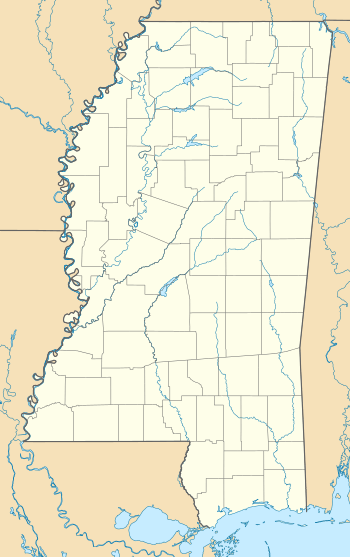Carnegie Branch Library (Meridian, Mississippi)
The Carnegie Branch Library at 13th St and 28th Ave in Meridian, Mississippi is one of two former Carnegie libraries in the city, both funded by a grant from Andrew Carnegie in 1904. This library was built for blacks while the other was built for whites. The other library was built at 25th Ave and 7th St and now houses the Meridian Museum of Art. Both buildings were listed on the National Register of Historic Places in 1979. The black library was demolished in 2008.
Carnegie Branch Library | |
  | |
| Location | 2721 13th St., Meridian, Mississippi |
|---|---|
| Coordinates | 32°22′10″N 88°42′23″W |
| Built | 1913 |
| MPS | Meridian MRA |
| NRHP reference No. | 79003385[1] |
| Added to NRHP | December 18, 1979 |
History
A group of women in the city had formed the Fortnightly Book and Magazine Club in the 1880s and began raising money to build a library for the city. The books they collected and shared within the club were later the basis of the library collection for Meridian. With wide support for the library, the club enlisted Israel Marks, a city leader, to approach the national philanthropist Andrew Carnegie for funding assistance.[2] Marks, who helped operate the Marks-Rothenberg Department Store next door to the Grand Opera House, was an acquaintance of Carnegie and convinced him to issue a $38,000 grant in 1904 to the city's government to build two Carnegie libraries — one for whites and one for African-Americans.[3] The white library would receive $30,000 while the African American one would receive $8,000.[4]
It was asserted to be the only Carnegie library ever built for African Americans in the country,[5] however the 1905-built Louisville Free Public Library, Western Colored Branch appears to be another.
The city used the money both to renovate the vacant building (formerly owned by the First Presbyterian Church of Meridian) at 25th Ave and 7th St and transform it into the white library and to build the African American library at 13th St and 28th Ave on land donated by a local Methodist church.[6] The African American library was the first and only library for blacks in the state until after World War I.[7]
The two libraries served the city until 1967, when the institutions became integrated, combined their collections, and moved all materials to the new Meridian Public Library at 2517 7th St.[3] The former white library was renovated and converted into the Meridian Museum of Art in 1970, and the former African American library was demolished on May 28, 2008.[8]
References
- "National Register Information System". National Register of Historic Places. National Park Service. March 13, 2009.
- Anne McKee (2008-01-11). "I could write a book..." The Meridian Star. Meridian, MS. Archived from the original on 2012-09-08. Retrieved 2008-06-08.
- Anne McKee (April 26, 2007). "The little museum that could, and did, thrive into the Twenty-first century". The Meridian Star. Archived from the original on September 4, 2012. Retrieved July 17, 2009.
- Jones, Theodore (1997). Carnegie Libraries Across America. New York: John Wiley & Sons. ISBN 0-471-14422-3.
- Robert J. Cangelosi, Jr. (September 19, 1988). "National Register of Historic Places Inventory/Nomination: Merrehope Historic District" (pdf). National Park Service. Cite journal requires
|journal=(help) - Meridian Star - I could write a book... Archived September 8, 2012, at Archive.today. An article on the history of Meridian's libraries.
- Neil R. McMillen (1990). Dark Journey: Black Mississippians in the Age of Jim Crow. Chicago, Illinois: University of Illinois Press. Retrieved 2009-07-17.
- Tametria Conner (2008-05-28). "Former Carnegie Library Demolished". Meridian, MS: WTOK-TV News. Archived from the original on 2011-05-19. Retrieved 2008-06-09.